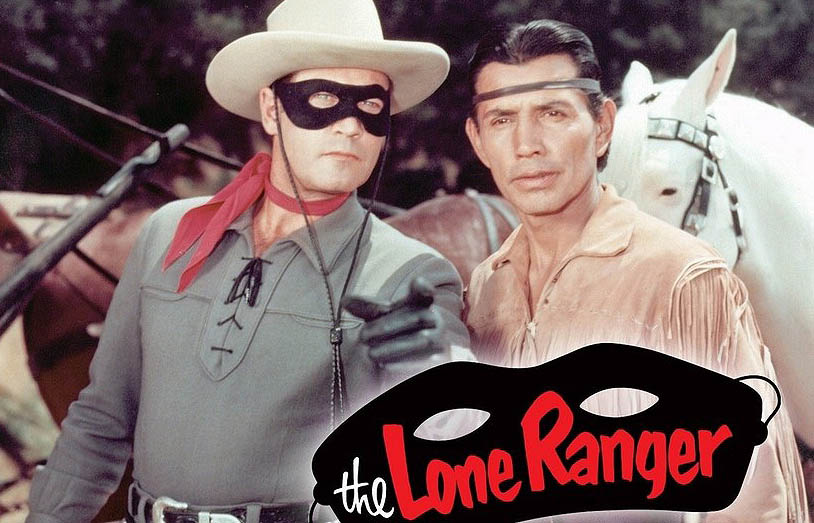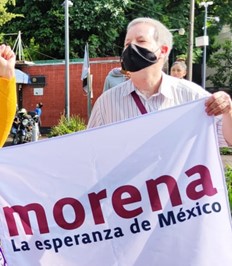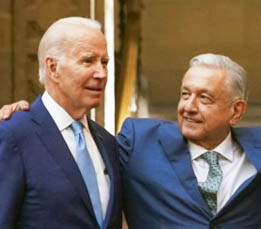|
|
|
|
The weekly newsletter of the México Solidarity Project |
|
|
|
Online at mexicosolidarityproject.org |
|
January 18, 2023/ This week's issue/ Meizhu Lui, for the editorial team |
|
|
‘Three Amigos’? Or Two Amigos and a Sidekick? |
|
Journalists over the years have taken to calling the annual North American Leaders Summit the “Three Amigos” meeting. The United States and Canada certainly do pretty much stand arm-in-arm, but México has always been the little brown sidekick, always supposed to be ready and willing to do whatever dirty work the globe-trotting Lone Ranger — the United States — asks him to do.
At last week’s Summit, AMLO pulled the mask off this “three amigos” trope after President Biden, trying to signal that he holds México in higher regard than past presidents, said he sees México as the front yard, not the back. AMLO quickly rejoined that México is sitting in nobody else’s yard, either back or front. Mexicans, he pointed out, have their own yard.
The United States has been pointing a gun at México’s feet for centuries now and commanding Mexicans to dance. No camera trick can make México an equal amigo.
So how can Tonto become the Lone Ranger’s equal or at least run his own show? That turned out to be the story line in the background behind last week’s trilateral Summit. Would Tonto have to make strategic concessions to break free?
Before criticizing the concessions México did make last week, let’s consider what might be necessary to challenge its militarily and economically well-armed boss. Let’s think more deeply, as Morena activist Pedro Gellert suggests in our interview this week, about how México can gain real control of its own destiny in the years ahead.
Many of us years ago cheered for the TV Tonto. We now need to practice solidarity as our contemporary Mexican Tonto attempts to ride off into the sunset on his own horse, off to right the wrongs the Lone Ranger has done to Tonto’s own Mexican people. |
|
|
|
Don’t miss an issue. Subscribe to the weekly México Solidarity Bulletin! |
|
|
|
|
How México Views Today's Fractured World |
|
Pedro Gellert, a rank-and-file Morena activist, has been involved in international solidarity efforts with nations that range from Cuba to Palestine. Gellert formerly edited the Morena Internacional newsletter, and his membership in the México Solidarity Project reflects his longstanding commitment to internationalism.
The 10th North American Leaders Summit took place in México City January 9 and 10. What did President López Obrador hope to achieve?
México wants to better its position in relationship to the United States and enlist the US and Canada in efforts “to reduce the poverty and inequality that are growing in the Americas,” as Foreign Minister Marcel Ebrard frames it. |
|
|
Poverty and inequality underlie migration, a central issue for the 2023 summit. President Biden wants migrants to stay in México. The US is having those migrants who do make it across the border deported back to México, not — thankfully — to their countries of origin. But this policy puts an unfair burden of responsibility onto México, a nation that has had no hand in the region’s political and economic disruptions.
AMLO, for his part, came to the summit also wanting the United States to regularize the status of the millions of undocumented Mexicans living in the US. |
|
Trade policy has become another critical area for negotiations. México, for example, wants to ban imported GMO yellow corn, as part of its food safety policy.
Corn imports from the US have destroyed the livelihoods of Mexican farmers and the traditional diversity of corn varieties available.
Does AMLO have any bargaining chips? |
|
|
GMO corn disguised as organic. Photo: 123RF |
|
His strategy has to rely, in part, on using the China card to force Biden to make concessions. The US wants México to join with it to isolate China and stop its global economic expansion. But Latin American countries have been more favorable to Chinese investments. |
|
These Chinese investments come with fewer strings than those from Western nations. Many Latin Americans also feel some pride that a third world country has become able to challenge Washington’s hitherto unchallenged hegemony. After all, the US — and not China — has “underdeveloped” the Latin American region.
Gaining sovereignty over México’s own energy sector has been a major goal for AMLO. His re-nationalization policies brought howls of protest from the US and Canada. |
|
|
Photo: VOA News, January 10, 2023 |
|
True, but this issue didn’t sit on the Summit table. It’s being negotiated in other venues.
Have México’s foreign policy goals changed since AMLO’s election?
Yes. AMLO has publicly denounced the Organization of American States, the OAS, as a US tool. The Uruguayan conservative Luis Almagro heads the OAS, and he played a direct and active role in engineering the coup that ousted Bolivia’s leftist President Evo Morales in 2019. AMLO has played a regional leadership role in urging Latin America to consider forming its own economic bloc without the US.
A second difference: All Latin American countries have opposed the US blockade in Cuba. But AMLO has also gone out of his way to praise Cuba and to stand solidly with Cuban President Díaz-Canel.
Both mainstream politicians and US leftists have criticized México for including Nicaragua — whose leaders have embraced undemocratic practices and violated human rights — in its bloc. What stance toward those practices and violations is México taking?
The Mexican government withdrew its ambassador in protest of those policies. The current imprisonment of the well-known leftist sociologist Oscar René Vargas, a supporter of the Sandinista revolution who once taught at the UNAM in México, has been particularly painful. But the Mexican government under AMLO, in keeping with Mexico’s historic stand of non-intervention, has made no public declarations against the Ortega government.
México granted asylum to Bolivia’s ousted president Eve Morales and, more recently, to Peru’s ousted President Castillo’s family. Does this support for leftist governments represent a break from the past? |
|
Anti-imperialism has long been part of Mexican political culture and extends into bourgeois political circles as well. In the 1930s, Mexico emerged as a leading voice opposing Italy*s invasion of Ethiopia, the first fascist salvo that led up to WWII. México opposed the Franco dictatorship in Spain — and had no relations with Spain while Franco was holding power.
The Cold War mentality ran weaker in México than in other nations in the region. In the 1970s, President Echeverría spoke out against Zionism and voted at the UN to designate Israel’s policies as racist. |
|
|
Spanish refugees in Veracruz, 1937. Archivo General de México |
|
Granting asylum has also long been part of the Mexican political culture. México took in refugees from the Spanish Civil War in the 1930s and thousands of Central American and Argentinian exiles during the dirty wars of the 1960s through 1980s. AMLO has moved in line with these traditions. |
|
Does this stance against imperialism apply to Russia and the war in Ukraine?
At the UN, México and France moved first to condemn the invasion, and México supports the right to self-determination for all countries. But many Mexicans and Morenistas do not blame Russia. They blame NATO. Unfortunately, in my opinion, they take the easy and often incorrect view that “the enemy of my enemy is my friend.” Their suspicions about the hegemonic interests of the US, based on the Mexican historical experience, exceed their doubts about Russia’s imperialist intentions.
The current position of the Morena government opposes sanctions — the government opposes sanctions everywhere — and sits officially neutral in the conflict.
What support can US internationalists give to México as it attempts to shake loose from the grip of the United States?
We need to see a national coordinating committee in solidarity with México, the sort of committee we’ve seen for Cuba, Venezuela, and Central America. Mexican-Americans — millions remain eligible to vote in Mexican elections — could help ensure progressive leadership in México into the future. These Mexican-Americans need to be organized.
A national coordinating committee in solidarity with México could sponsor tours for working people to build understanding of our common interests and develop joint strategies. A first order of business could be countering the huge elite media campaign now ongoing against México’s Morena government. We can start on that project right now!
|
|
|
Biden and Trump: The Enduring US Policy on Migration |
|
US President Joseph Biden, shortly after issuing a new US policy on immigration, traveled to Mexico January 9 to finally meet with Mexican President Andrés Manuel López Obrador. Biden stopped on his way to visit El Paso, at the border with Ciudad Juarez, and the US mainstream media gave a great deal of attention to both that visit and the meeting with AMLO, where migration would be a key topic. |
|
Biden has been under relentless pressure from racist right-wing Republicans like Texas Governor Greg Abbott and Florida Governor Ron DeSantis for not closing the border completely as well as for refusing to continue constructing Donald Trump’s infamous border wall and pursuing a legal process that allows only a tiny percentage of refugees to apply for asylum in the United States. |
|
|
The short story here: Biden has essentially given in to Republican political pressure on the immigration front. He has decided to continue the Trump policies that deport asylum seekers to México and force those who haven’t yet entered the US to apply for asylum to “wait in México.”
The US now allows 30,000 refugees per month from Cuba, Haiti, Venezuela, and Nicaragua to apply for asylum, but these refugees must do so from México. But what about the thousands of Central Americans who need asylum? Their stories don’t fit tidily into the narrative that only leftist governments are creating the asylum problems.
Our media also ignore the US policies that have forced people from Haiti, Cuba, and Venezuela to leave home in the first place. With Cuba and Venezuela, the US economic embargoes have slammed the economies of the two nations. In the case of Haiti, US complicity in the 1991 coup that ousted progressive President Jean Bertrand Aristide led to a return of a brutal and corrupt oligarchy and perpetual instability.
In the case of Nicaragua, President Daniel Ortega’s repression of dissidents — including Ortega’s former Sandinista and leftist allies — are forcing people to flee that nation. The US is using Nicaragua as an example of what happens when Latin American countries elect a “left-wing” government, but Ortega has long abandoned any pretext of being progressive or in any way “left.”
AMLO has decided to go along with these policies set by Colossus of the North.
Compromises, of course, always reflect power dynamics, and the US still remains our world’s Superpower. Even so, Mexicanos and Chicanos in the US — groups that see immigration as a huge concern — had hoped that any new Mexican compromises would result in some US concessions. But the current migration negotiations will only result in an increased militarization of both sides of the border, further misery for millions of migrants, and a huge economic burden on México.
Did Biden learn anything from visiting the border? Did it increase his understanding or compassion? Trump, Biden, no change: The US continues to dodge responsibility and shift the blame onto left-wing governments real or imagined — and put the burden of dealing with the escalating number of migrants on México’s back. |
|
Bill Gallegos, a veteran Chicano |
|
|
|
Recent news reports and commentaries, from progressive and mainstream media,
Stuart Trew, Manuel Perez-Rocha, and Karen Hansen-Kuhn, Three Amigos or Fair-Weather Friends? Foreign Policy in Focus. Dubious challenges to Mexican food and energy sovereignty soured last week’s North American Leaders Summit.
Jessica Xantomila, Se registraron al menos 483 ataques en ámbito político en 2022: Data Cívica, La Jornada. Esta cifra es 174 por ciento superior a la del año pasado, cuando se registraron 176 eventos de este tipo.
AMLO urges Biden to lead further regional integration at bilateral talks, México News Daily. President López Obrador called on United States President Joe Biden to end U.S. “abandonment” and “disdain” toward other countries in the region during frank opening remarks at last week’s bilateral talks.
El peso rompe la barrera de 19 unidades por dólar: se cotiza en 18.94, Proceso. Sin embargo, recomendaron ver con cautela esta apreciación del peso mexicano, ante los indicadores fundamentales y técnicos que señalan una alta probabilidad de rebote en el mediano plazo.
AMLO, Trudeau hammer out ambitious Mexico-Canada ‘action plan,’ México News Daily. The plan focuses on issue areas ranging from reconciliation with Indigenous peoples and gender equality to climate change and women’s empowerment.
Alejandro Calvillo, Biden, Glifosato & Co. vs la vida del suelo, Sin Embargo. La regeneración del suelo es fundamental para enfrentar el cambio climático, ya que la mayor reserva de bióxido de carbono terrestre se encuentra en los suelos.
David Shortell, ‘There aren’t any locals renting here now,’ prices soar as remote workers flock to México City, Irish Times. Americans and Europeans are using Airbnb to find long-term rentals in México’s capital, pushing housing costs higher and forcing out local residents.
México, en pláticas con mineras por proyectos de litio, Proceso. El presidente López Obrador dijo que el gobierno está buscando llegar a un acuerdo con las empresas para que acepten el nuevo marco.
Robin Alexander, International Solidarity in Action. This new e-book tells the story of the partnership between the United Electrical, Radio and Machine Workers of America (UE) and the Mexican Frente Auténtico del Trabajo (FAT), a story that has become testimony to the power of rank-and-file solidarity. Available for download at little or no cost. |
|
|
The Mexico Solidarity Project brings together activists from various socialist and left organizations and individuals committed to worker and global justice who see the 2018 election of Andrés Manuel López Obrador as president of México as a watershed moment. AMLO and his progressive Morena party aim to end generations of corruption, impoverishment, and subservience to US interests. Our Project supports not just Morena, but all Mexicans struggling for basic rights, and opposes US efforts to undermine organizing and México’s national sovereignty.
Editorial committee: Meizhu Lui, Bruce Hobson, Bill Gallegos, Sam Pizzigati, Courtney Childs, Victoria Hamlin, Agatha Hinman, Steven Hollis, Daniel McCool, Betty Forrester. To give feedback or get involved yourself, please email us! |
|
|
|
Web page and application support for the México Solidarity Project from NOVA Web Development, a democratically run, worker-owned and operated cooperative focused on developing free software tools for progressive organizations. |











